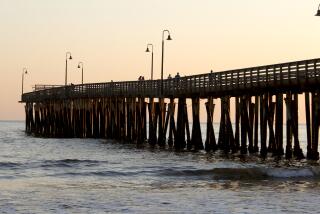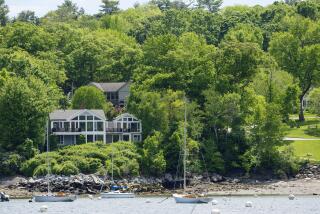Sudden Property-Tax Jump Sparks a Revolt on Maine’s Coastal Islands
- Share via
CLIFF ISLAND, Me. — Roger Berle lives in Maine’s largest city, but his neighborhood has dirt streets, no police protection and can be reached only by boat.
Cliff Island, 8 miles out in Casco Bay, is within the city limits of Portland, but life here is so different, so distant from Portland that Berle speaks of events happening “over there, in America.”
Berle considers this an ideal place to work and rear a family, far from the urban hubbub, congestion and crime but close enough to take advantage of the good things in the city--the museums, the restaurants, the concerts.
“We’re in our own world out here, yet, with a fast boat, we’re only 25 minutes away from a vibrant city with all that it has to offer,” he says.
But these days, Berle and others warn, Cliff and some of Portland’s five other inhabited islands in Casco Bay are imperiled by the very city that has governed them since 1786. Many islanders are in revolt against the City Council since reassessments doubled, even tripled, their property taxes this summer.
Residents of the islands, mostly lobstermen, are talking about seceding from Portland and starting their own municipal government. They have launched a campaign to throw most of the City Council out of office.
Berle and others fear that the increasing taxes could force many year-round island residents to sell their homes and move off, leaving the islands to evolve into summer vacation havens for the rich.
“I’ve worked for 20 years to keep the year-round community from dying,” Berle said. “Year-rounders have a limited income, and if they can’t pay their taxes that means the only people who can live out here are summer people.”
The Casco Bay islands are among hundreds that lie off the Maine coast. They were among the first places settled in North America, preservationists say.
“There is no other state along the Atlantic that has as many year-round island communities,” said Philip Conkling, executive director of the Island Institute, a nonprofit preservation group.
Conkling said the number of islands with year-round communities has diminished to 14, from about 300 at the turn of the century. Five are in Casco Bay, and Conkling shares the concern for their survival.
The islanders “feel they’re being taxed into the ground at a rate that will, essentially, make it impossible to sustain traditional fishing communities,” Conkling said.
He said some city officials want to promote development of the islands as vacation communities for the wealthy. “The reason is you can tax people with second homes through the nose and you don’t have to provide any services,” Conkling said.
Mayor Tom Allen denied that. “It just is ridiculous to think that the city would have a policy of driving longtime residents off the islands,” he said.
Allen said the city is required by state law to conduct periodic property revaluations. He said the consulting company that performed the $1-million revaluation this year made mistakes in assessments, and city officials are trying to correct the errors.
“Once we’ve corrected the mistakes,” Allen said, “it’s still going to be true that the property values on the islands have gone up more than property on the mainland. That’s market forces at work. That’s not city policy.”
Portland is one of a few cities that govern traditional island communities. Six of Casco Bay’s seven largest inhabited islands--Cliff, Long, Peaks, Great Diamond, Little Diamond and Cushing--have been part of Portland since it was incorporated in 1786.
The other major inhabited island, Great Chebeague, has been governed by the town of Cumberland. The rest of Maine’s islands have their own town governments.
The Casco Bay islands, linked to Portland by ferry, have different characters, based on the ratio of summer vacationers to year-round residents. Each harbors its own natural treasures, from Long Island’s Singing Sands beach, where the sand and wind make humming sound, to Cliff’s 35-foot bluffs.
Peaks Island, the closest to Portland, has about 1,000 of the islands’ 1,300 permanent residents.
Little Diamond and Great Diamond, across from Peaks, are predominantly summer colonies, although eight families live year-round on Great Diamond. On the other side of Peaks, Cushing Island has no ferry service and is private, accessible only to property owners and their guests.
Farther out in the bay, beyond Peaks and Great Diamond, are Great Chebeague, Long and Cliff islands, which have traditional fishing communities.
Berle, one of Cliff’s 70 residents, said: “I like the fact that laws are enforced less rigorously out here. The roads are dirt. Everyone is on a first-name basis out here.”
Berle has spent every summer of his life on Cliff. He moved to the island permanently 20 years ago. His small construction company and another are Cliff’s only major industries aside from lobstering.
“I grew up in suburban Boston, and there’s a set of expectations out there--that you have to grow and achieve certain financial goals,” Berle said. “You don’t have any of that out here.”
He and others fear that lobstermen may no longer be able to afford to live on the islands and that property owners who inherited their homes and island-living traditions from parents and grandparents will have to sell.
Ted Weber, a part-time lobsterman on Great Diamond Island, saw the assessed value of his four-bedroom home jump from $39,500 to $164,400, and his taxes rise from $1,185 to nearly $4,300. Now, he and his wife are trying to sell their house.
Such tax increases are common and could accelerate the trend toward gentrification of the islands, some residents contend.
“Obviously, there’s going to be gentrification, but it can be controlled,” said Patrick Gardner, a Peaks Island resident and a leader of the secession movement.
Gardner, who spent most of his life in Iowa, discovered Peaks in 1976, fell in love with the island and moved there permanently five years later.
Gardner and his wife designed and built their house on Peaks’ rocky back shore, a picturesque spot looking out onto the open ocean.
Although the 2 1/2-story house isn’t finished yet, he said, the revaluation sent his property value from nearly $70,000 to $227,000, and doubled his yearly tax bill from about $2,400 to nearly $5,000. Like many islanders, Gardner appealed his revaluation and has succeeded initially in lowering it to $225,000.
Gardner also has channeled his anger into the secession movement and is leading a separate campaign to recall three-quarters of the City Council members.
“When my taxes doubled, I decided it was time to draw a line and attack,” Gardner says.
More to Read
Sign up for Essential California
The most important California stories and recommendations in your inbox every morning.
You may occasionally receive promotional content from the Los Angeles Times.










